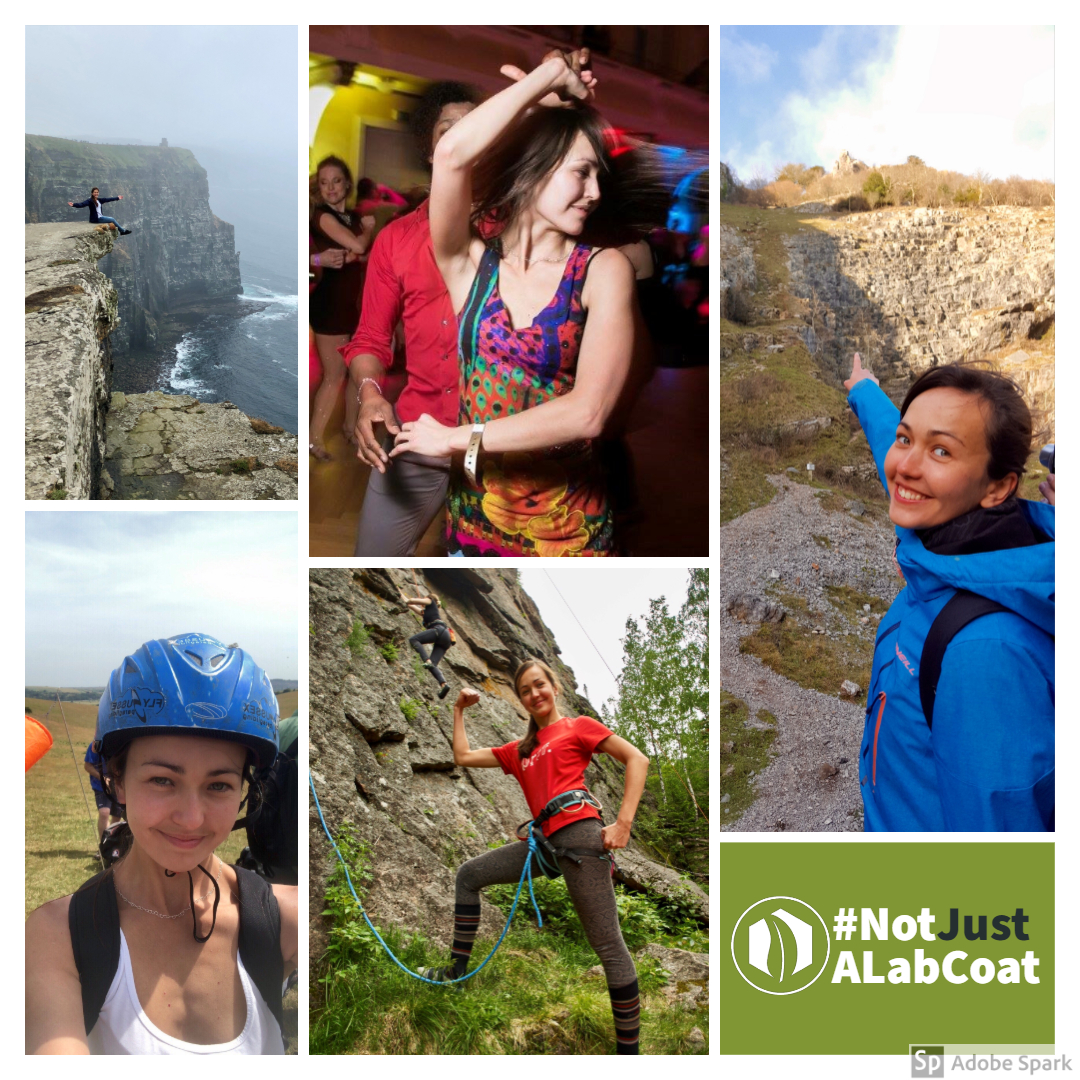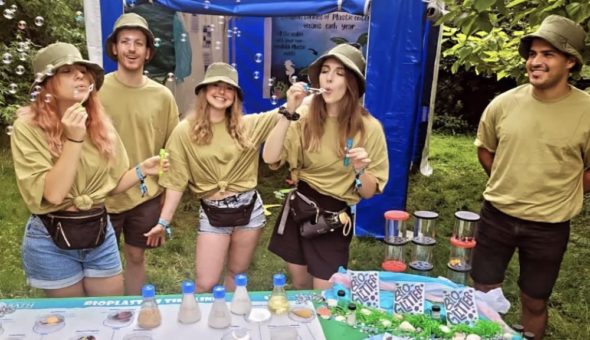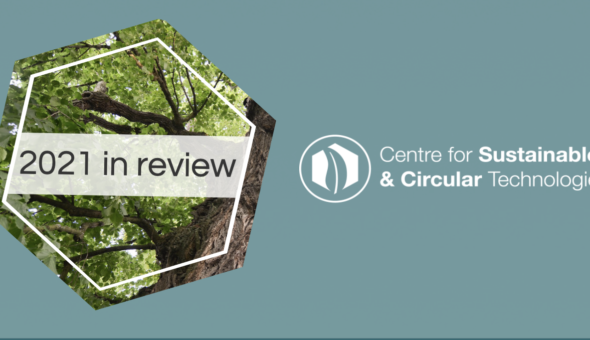Dr Elizaveta Suturina is an early career researcher who was appointed University of Bath Prize Fellow in Sustainable Chemical Technologies in August 2018. These fellowships are intended to fast-track fellows to a permanent appointment at the University by allowing them to focus on their research and establish their own groups.
Since her appointment, Elizaveta has been working on forming her research group while continuing to pursue the research topics she loves: computational chemistry, spectroscopy and paramagnetism. In this interview, she tells us about her work, the challenges of starting a career in academia, and all the things she would do if she didn’t have to worry about funding.
What is your role at the CSCT?
My research in computational chemistry and its applications to what is known as ‘paramagnetic systems’ contributes to the diverse expertise of the CSCT. For example, I offer student projects with applications in magnetic resonance imaging (MRI), where they would be involved in the design of contrast agents that can improve the diagnostic capabilities of MRI.
Other projects are relevant to structural biology, where we try to get precise information on the structure of proteins, which is essential for modern drug design.
I also offer projects on new molecular magnetic materials, which can potentially combine diverse properties of organic materials, such as transparency or plasticity, with the magnetic properties that are usually associated with metal alloys like those found in fridge magnets or in the magnetic memory of computers.
What made you follow the academic career path?
I always liked fundamental science and people who wonder why things are as they are, and academia is the only place where we can do this as a job. I pursued this career with all my courage and went through three academic systems -in Russia, Germany and the UK- to get to the point where I find myself today. It is a bit easier to find your dream job when you are ready to travel the world.
Can you give us an overview of what you do?
I work in theoretical chemistry, creating models of molecules and predicting their properties using quantum chemistry. These models help us to spot the key features of the molecules that make them functional and suggest modifications that could improve their functionality.
I always was amazed by spectroscopy and by people who can look at a strange wriggle on a screen and say that there is compound “A” rather than a compound “B” in the test-tube. In my work, I try to combine quantum chemistry methods and spectroscopy to extract as much information as possible about the compounds in question. In particular, I am interested in Nuclear Magnetic Resonance (NMR) spectroscopy, which forms the basis of MRI imaging.
What projects are you working on at the moment?
The most recent of my projects is related to MRI and how it can be improved. Working in collaboration with Professor David Parker, Fellow of the Royal Society based at Durham University, we are trying to improve the properties of MRI probes that can provide data on both local temperature and pH in addition to standard scan information. To do this, we need to understand how the structure of these probes affects their sensitivity to different temperatures. This requires using computational chemistry models to investigate their structure (and how this structure affects function) and developing new tools to process experimental data.
I really like that this project addresses fundamental aspects of paramagnetic NMR, while it may also have impactful applications in healthcare.
What are the challenges of being a young researcher in your position?
I think one of the biggest challenges is attracting talented students, because at the start of your academic career you are relatively unknown.
Getting sufficient funding to kick-start a research group is also quite challenging, especially since major UK funding agencies exclude PhD studentships from most grant schemes. As a Prize Fellow, I am not eligible to bid for University-funded studentships either, but luckily the Chemistry Department distributed EPSRC Doctoral Training Partnership studentships to support young researchers.
What other challenges have you encountered during your academic career?
Transitioning from post-doc to independent researcher has been my most challenging career event so far – both in terms of finding a position and adapting to the new role. Balancing teaching, supervision, administrative tasks and research requires some skill, but I’m learning to maximise my efficiency. Luckily, my department is quite supportive and my colleagues always give good advice when I need it.
What have you found most rewarding about the academic world?
Being surrounded by lots of people with brilliant minds, who get excited about the beauty of science without caring primarily about commercial interest, profits and gains.
Another big reward for me comes from understanding new things and solving problems no one else has been able to solve before.
What tip would you give your PhD self if you could go back in time?
Try to look at the bigger picture at the early stage of the project before diving into details. I often did it the other way around.
Academia in Russia vs academia in the UK – how do they compare?
Research in Russia is concentrated in the institutes, and in the UK it is mostly in universities. Due to UK group leaders having more teaching and admin duties compared to their equivalents in Russia, I think UK students often get less direct supervision.
In Russia, basic salaries in academia are quite low but can be topped up with grants. Even as a student, I spent a lot of time writing grant proposals and reports. It is great that in the UK academic salaries are closer to industry, and some grants are given for research purposes only.
What are the best memories of your PhD?
A winter school in Mariapfarr on correlated methods in theoretical chemistry was a very good experience: lectures from leading specialists in the field in the mornings and in the evenings, combined with skiing at lunchtime. I did learn a lot and also had a great time with my colleagues in the Austrian mountains.
Who are your mentors, or who are you inspired by?
My PhD advisor Professor Nina Gritsan had a big influence on me. She manages to be successful in every aspect of her life, and create a very good working environment in her lab.
I was also lucky to work with Professor Frank Neese, Director of the Max Planck Institute for Coal Research, who inspired me to follow the beauty of spectroscopy and ab initio theory, and to be deductive in my approach to research.
What would you do if you had an unlimited amount of funding to do research?
In a dream world, I would create an organisation similar to the Max Planck Society, with excellent technical staff on permanent jobs and supportive administration that shields scientists from bureaucracy. I would attract the best specialists from around the world so that they would not be limited in resources or research topics.
As for my own project, I’d continue my efforts in bringing computational chemistry and spectroscopy closer together.
If you won the lottery…
If I won the lottery, I’d probably invest the money left after a week of partying (if there is any!).
Is there a public engagement activity you’d spearhead if you had unlimited resources?
In my opinion, there aren't enough public engagement activities designed for adults.
As an adult who does not find science museums very engaging, I’d like to make an interactive research museum, where adults can learn more about the modern science that surrounds us with a hands-on approach.
During ‘moments of darkness’, what makes you smile?
My partner, family and friends give me lots of energy and support me in difficult times.
What’s your ideal job description?
I enjoy doing research, and I would like to keep doing more of it for as long as I can. I actually quite like my current job description and I wish it would not change!
What would you be if you weren’t a scientist?
If it was not for science, I’d probably work in business consultancy. A lot of businesses around the world use inefficient or obsolete technologies, and I would like to contribute to accelerating the spread of new technological solutions.
What three things do you always carry in your bag?
Like most of us these days, I only check my bag for phone, wallet and keys.
What do you do when you’re not at work?
I like dancing and have been doing it for as long as I can remember - starting from Russian traditional dances when I was a kid, Irish and Medieval dances at the end of school, and ballroom dances at uni. For the last eight years or so I’ve been dancing salsa. Social dancing gives the opportunity to meet people with different backgrounds who are united by music.
I also like travelling, hiking, skiing, diving and cycling, and every year I try something new. This summer, for example, I’ve started learning how to ride a motorbike, and last year I tried paragliding. Not every activity becomes my hobby but I like to explore.
Fun facts about you?
I still can’t buy cider in shops without my ID!
Respond



